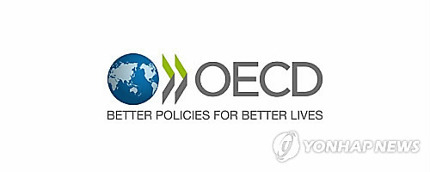The Organization for Economic Cooperation and Development has urged Korea to pursue reform and innovation through policies aimed at sustaining growth and boosting small and medium-size enterprises and start-ups amid a slowdown.
In its economic outlook report, the OECD said Monday that Korea will need to further implement fiscal and monetary stimulus to “sustain expansion,” while trying to maintain fiscal soundness by increasing tax rates on expectations of rising social spending due to the aging population.

“Additional fiscal stimulus is called for in 2016 to eliminate any fiscal drag, all the more so given Korea’s sound public finance position,” the OECD report said.
“There is a case for further monetary easing, as inflation is still far below the new target. Maintaining a sound fiscal position in Korea is a priority given spending pressures, including those stemming from population ageing and the potential cost of intensified economic cooperation with North Korea.”
However, the OECD also reminded Korea of the risks of extra fiscal spending and monetary easing as they could affect the country’s public and household debt, while a lower benchmark interest rate could spur capital outflows.
It noted that Korea’s consumer price index remains below its 2 percent target for 2016-2018, and suggested that the country broaden its tax base by reducing exemptions and increasing consumption tax and environment-related tax rates, as they are below the OECD average.
As Korea’s economy is projected to grow 2.7 percent this year, down from its initial outlook of 3.1 percent, the OECD said that it is imperative that Asia’s fourth-largest economy pursue structural changes. It also lowered Korea’s growth forecast from 3.6 percent to 3 percent in 2017.
It added that its traditional growth model led by family-run conglomerates, or chaebol, has run its course, and that the time is ripe for Korea to stimulate small and medium-size enterprise competition and entrepreneurship for sustainability.
“Productivity growth has slowed markedly, slowing the rise of incomes and well-being. This calls for ambitious reforms to strengthen competition and raise efficiency in low-productivity services and in SMEs,” it said.
“The creative economy is to be driven, in part, by regulatory reform and increased competition to stimulate entrepreneurship and improve efficiency, especially in SMEs, where productivity is only 30.5 percent of that in large firms.”
As Korea further faces slower productivity with its population expected to age the fastest among OECD economies, the OECD also suggested reforms in the labor market.
“Removing the substantial obstacles to the employment of women, youth and older people would promote social inclusion,” it said.
By Park Hyong-ki (
hkp@heraldcorp.com)







![[Today’s K-pop] Blackpink’s Jennie, Lisa invited to Coachella as solo acts](http://res.heraldm.com/phpwas/restmb_idxmake.php?idx=644&simg=/content/image/2024/11/21/20241121050099_0.jpg)
